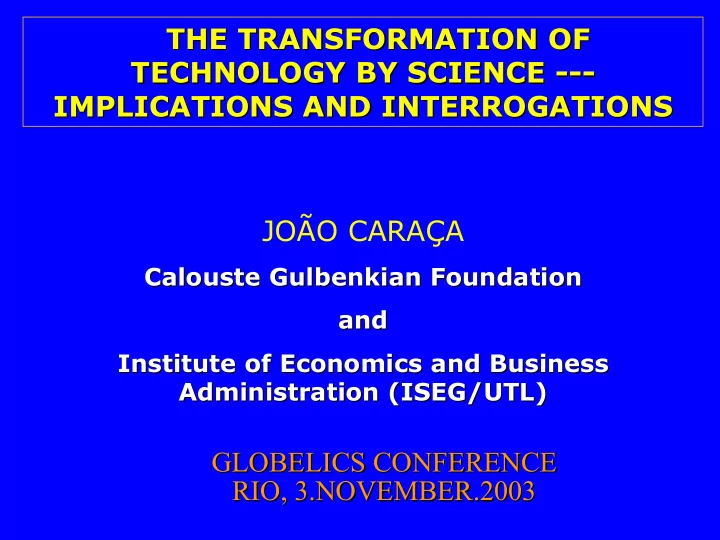

THE TRANSFORMATION OF THE TRANSFORMATION OF TECHNOLOGY BY SCIENCE --- --- TECHNOLOGY BY SCIENCE IMPLICATIONS AND INTERROGATIONS IMPLICATIONS AND INTERROGATIONS JOÃO CARAÇA Calouste Gulbenkian Foundation Calouste Gulbenkian Foundation and and Institute of Economics and Business Institute of Economics and Business Administration (ISEG/UTL) Administration (ISEG/UTL) GLOBELICS CONFERENCE GLOBELICS CONFERENCE RIO, 3.NOVEMBER.2003 RIO, 3.NOVEMBER.2003
«Democritus (...) is the last of the Greek philosophers to be free from a certain fault which vitiated all later ancient and medieval thought (...). Their attitude, in the main, was genuinely scientific whenever it did not merely embody the prejudices of their age. But it was not only scientific; it was imaginative and vigorous and filled with the delight of adventure. They were interested in everything --- meteors and eclipses, fishes and whirlwinds, religion and morality: with a penetrating intellect they combined the zest of children. From this point onwards, there are first certain seeds of decay, in spite of previously unmatched achievement, and then a gradual decadence. What is amiss, even in the best philosophy after Democritus, is an undue emphasis on man as compared with the universe. First comes scepticism, with the Sophists, leading to a study of how we know rather than to the attempt to acquire fresh knowledge. Then comes, with Socrates, the emphasis on ethics; with Plato, the rejection of the world of sense in favour of the self-created world of pure thought; with Aristotle, the belief in purpose as the fundamental concept in science. (...) After their time, there was a decay of vigour, and a gradual recrudescence of popular superstition». Bertrand Russell A History of Western Philosophy (1945).
HOW KNOWLEDGE EVOLVES HOW KNOWLEDGE EVOLVES SURVIVAL SURVIVAL FORCE FORCE EMOTION EMOTION • food • food • transport transport • • tools & tools & TECHNIQUE TECHNIQUE materials TECHNOLOGY SCIENCE materials TECHNOLOGY SCIENCE • processes • processes • culture & culture & • RITUAL RITUAL organization organization TACIT EXPLICIT DISCIPLINARY TACIT EXPLICIT DISCIPLINARY Source : Caraça 2001
TRANSFORMATIONS IN SOCIETY TRANSFORMATIONS IN SOCIETY (SURVIVAL) (SURVIVAL) SOCIAL SOCIAL COMPETITION COMPETITION ORGANIZATIONAL ORGANIZATIONAL N N O O I I T T A A CHANGE CHANGE ADJUSTMENT ADJUSTMENT V V O O N N N N I I perception perception adaptation adaptation attitude learning attitude learning TECHNOLOGICAL TECHNOLOGICAL RISK TIME RISK TIME Source: Polanyi 1944
IMPLICATIONS OF THE NEW PROCESS OF IMPLICATIONS OF THE NEW PROCESS OF TECHNOLOGICAL DEVELOPMENT (S T) - - I I TECHNOLOGICAL DEVELOPMENT (S T) 1. New sectors of of economic activity (hi economic activity (hi- -tech tech) ) 1. New sectors 2. A new discipline (science policy / STS) 2. A new discipline (science policy / STS) 3. A new A new political political need need ( (diffusion, pus, pas, pes) diffusion, pus, pas, pes) 3. 4. New concepts (S&T; R&D) 4. New concepts (S&T; R&D) 5. New societal relationships ( 5. New societal relationships (university university/ /industry industry) ) 6. A new structure (S&T system) ) 6. A new structure (S&T system
IMPLICATIONS OF THE NEW PROCESS OF IMPLICATIONS OF THE NEW PROCESS OF TECHNOLOGICAL DEVELOPMENT (S T) - - II II TECHNOLOGICAL DEVELOPMENT (S T) 7. New universities (the research university) ) 7. New universities (the research university 8. A new academic degree ( (the research Ph.D) the research Ph.D) 8. A new academic degree 9. A new profession ( (scientific researcher scientific researcher) ) 9. A new profession 10. A new skill/ /craft (technology management craft (technology management) ) 10. A new skill 11. The two Cultures 11. The two Cultures 12. A new mode of knowledge creation ( (Mode 2) Mode 2) 12. A new mode of knowledge creation
U.S. R&D funding, by source SOURCE: National Science Board, Science and Engineering Indicators-2002
Federal R&D support, by performing sector: 1953-2000 SOURCE: National Science Board, Science and Engineering Indicators-2002
CHANGING RELATIONS BETWEEN SCIENCE, CHANGING RELATIONS BETWEEN SCIENCE, TECHNOLOGY, THE ECONOMY & SOCIETY TECHNOLOGY, THE ECONOMY & SOCIETY globalization of the globalization of the global opportunities/ global opportunities/ markets markets greed/ /institutions ? institutions ? greed mutation in work and communicating/ mutation in work and communicating/ employment analysing/ /deciding ? deciding ? employment analysing new skills/ /learning/ learning/ new skills a more technological a more technological citizenship ? citizenship ? society society more science- -based based “commodization” or commodization” or more science “ technology emancipation ? technology emancipation ?
Recommend
More recommend